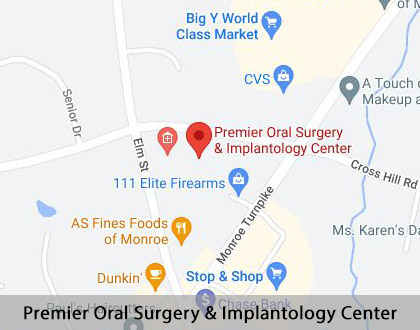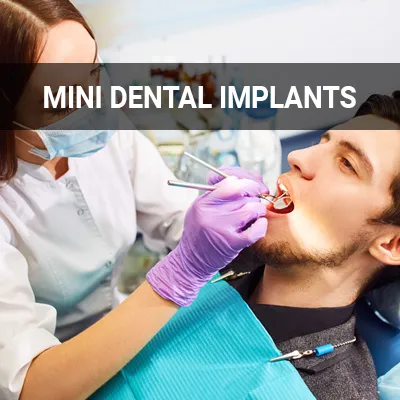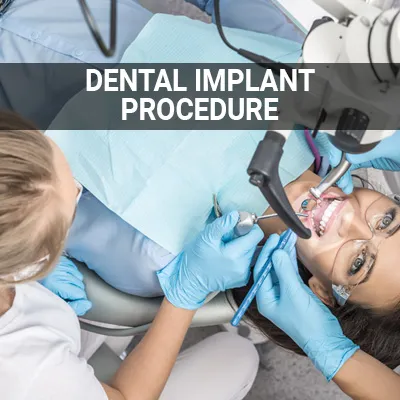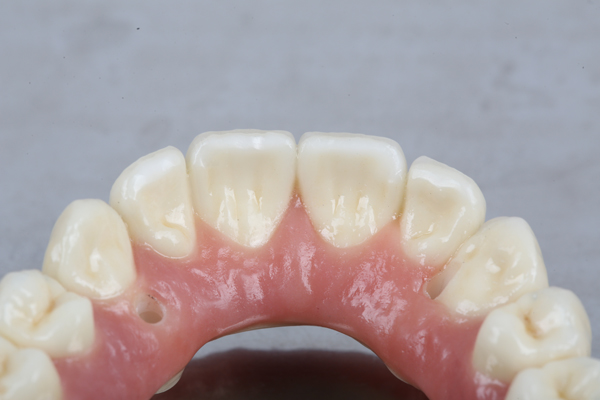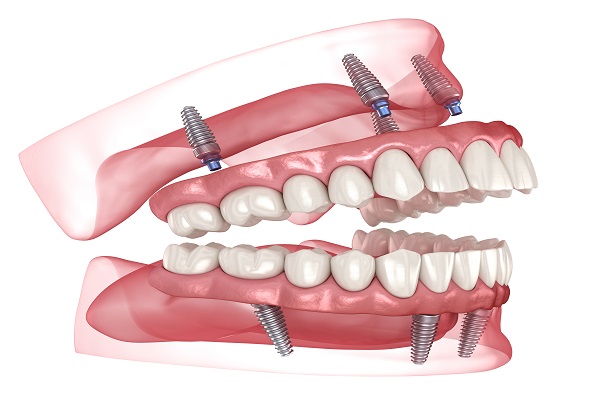The Difference Between Dental Implants and Mini Dental Implants Monroe, CT
People who have lost one or more teeth can have full oral health function by choosing dental implants. As an oral surgeon, we can offer regular or mini dental implants with implant restoration. Mini dental implants are smaller than conventional implants and do not require as much healthy bone tissue for placement. It is a good alternative for patients who do not want or cannot undergo a bone graft procedure.
Mini dental implants are available at Premier Oral Surgery & Implantology Center in Monroe and the surrounding area. They are a reliable option if you are hesitant about the invasive process of regular implants or do not have enough bone mass in your jaw to support them. Call our office at (475) 474-6204 to schedule an appointment.
What Are Dental Implants?
Standard implants and mini dental implants are the two main types of dental implants used for tooth restoration. Implants are titanium metal posts inserted into the jawbone, designed to mimic the tooth root and support a crown, bridge, or denture. Implant restorations are safe, stable, effective, and reliable.
However, since implants typically sit inside the jawbone, patients who have experienced jawbone resorption may not qualify for conventional dental implants without a preliminary bone graft procedure. Fortunately, mini dental implants provide a way out. With smaller dimensions, they do not need full bone mass for support and can restore one or more teeth on a dental arch without preparatory procedures.
Size and Shape of the Implants
Regular dental implants typically have a diameter of 3.25mm to 5mm, while mini dental implants can be between 2mm to 3mm wide. Due to their size, mini implants induce less effect on the jawbone and need less jawbone mass for support. They are also called narrow-diameter implants or small-diameter implants (NDIs or SDIs).
Regular implants consist of the implant post and abutment, which connect the restoration to the implant. In contrast, the mini implant is a solid single-piece screw consisting of a post and a ball-shaped top that is visible above the gum line. Restorations fabricated for mini implants often have a rubber O ring that connects to the ball.
“Implants are titanium metal posts inserted into the jawbone, designed to mimic the tooth root and support a crown, bridge, or denture.”
Eligibility for Mini Dental Implants
When a person loses a tooth, the process of bone degeneration begins. If it takes too long before seeking restoration, the individual may have lost too much bone density to support a regular implant. Jawbone atrophy may also result from periodontitis (gum disease), teeth misalignment, or damage from a broken or knocked-out tooth. In this case, their healthcare provider may recommend mini dental implants.
Additional cases where the oral health professional may suggest mini implants include:
- For front teeth restorations
- Premolar replacements
- Teeth positioned in a narrow gap
- For small teeth
- Where a person suffers from a chronic illness, has undergone radiation therapy, or smokes heavily.
Patients should seek the guidance of an experienced implant oral surgeon in order to determine which type of implant is right for them.
“If it takes too long before seeking restoration, the individual may have lost too much bone density to support a regular implant.”
Benefits of Mini Dental Implants
As previously mentioned, the most significant benefit of mini dental implants is that they allow patients who have lost a good portion of their jawbone structure to enjoy their benefits. Also, those who have endured poorly fitting lower dentures can get four to six mini implants to support the denture. Implant-supported dentures are more comfortable and stable than regular dentures.
Another benefit is that mini dental implants remove the need for major procedures – the placement procedure is relatively easy and non-invasive. Without invasive procedures, the healing time is faster since there are no incisions and suturing. The entire implant restoration procedure takes less time than regular dental implants and requires fewer office visits.
Both mini and standard implants help to prevent further tooth loss or atrophy. When a tooth is lost, the jawbone loses the stimulation provided by the tooth roots and gradually shrinks. Dental implants stimulate the jaw during chewing or biting to keep the bone healthy.
“Both mini and standard implants help prevent further tooth loss or atrophy.”
Check out what others are saying about our dental services on Yelp: The Difference Between Dental Implants and Mini Dental Implants in Monroe, CT
Drawbacks of Mini Dental Implants
Since mini implants are about half the size of regular implants, two MDIs are sometimes required to provide support comparable to one standard implant. This may induce slightly more stress on the jawbone and may extend healing time due to the different weight distribution.
Mini implants may not be suitable for patients who deal with teeth grinding or clenching. Known as bruxism, this issue typically places undue stress on the teeth and may weaken mini implants with time. To tackle this, the oral surgeon may recommend wearing a nightguard to protect the implant restoration.
The rubber O-rings on the head of the mini implants will require replacement when they loosen or wear out. The frequency of replacement typically depends on how often the patient removes and replaces their dentures.
“Since mini implants are about half the size of regular implants, two MDIs are sometimes required to provide support comparable to one standard implant.”
Questions Answered on This Page
Q. How do I know if I am eligible for mini dental implants?
Q. What are the benefits of mini dental implants?
Q. What are the disadvantages of mini dental implants?
Q. What happens during an implant placement procedure?
People Also Ask
Q. What is the upside of a mini dental implant?
Q. What is the duration and success rate of dental implant treatment?
Q. What questions should I ask about the recovery period?
Q. What are the benefits of dental crowns and dental implants?
Q. How do dentists determine whether a patient qualifies for dental implants?
The Placement Procedure
An oral surgeon can typically complete the placement of mini implants in one visit without making incisions or sutures. Meanwhile, regular implants involve two procedures. The first stage is intensive because the oral surgeon must create a gap in the jawbone for implant posts. The second stage is more straightforward and entails revealing the implant posts to connect the abutment.
If the patient requires a sinus lift or bone graft, they will need to wait for some months for the jaw to heal before implant placement. After the implantation procedure, it will take another three to six months before the surgeon can connect the final restoration.
Once preliminary procedures are completed, the treatment timeline for mini implants is greatly reduced. Sometimes, the patients may get a temporary dental prosthesis on the same day as the implant placement. Same-day restorations allow patients to achieve normal oral functions before the bones have fully healed.
“An oral surgeon can typically complete the placement of mini implants in one visit without making incisions or sutures.”
Frequently Asked Questions About Mini Dental Implants
Q. Are there durability differences between implants and mini dental implants?
A. Dental implants are created from titanium, a biocompatible metal that fuses with the jawbone. Both options are highly durable, but their lifespan typically depends on the level of care provided. By brushing, flossing, and going for routine oral health care, you can keep your oral cavity and implants in excellent condition for a long time.
Q. Will mini dental implants be as strong as my natural teeth?
A. In most cases, mini implants have the same strength – if not more – than natural teeth. Mini implants provide full dental functionality, and patients will be able to eat all their favorite meals. However, you need to be careful since implant restorations are just as vulnerable to damage as natural teeth.
Q. Are mini dental implants FDA-approved?
A. The FDA officially approved mini dental implants following significant clinical and technical studies. Having received this approval, the procedure is deemed safe for general use and beneficial to oral health. Mini dental implants were approved both for short-term and long-term use.
Q. Is the placement procedure painful?
A. Many patients often register their surprise when they realize the convenience of the implant procedure. If you struggle with dental anxiety, you should talk to the oral surgeon prior to the operation. They will discuss options to keep you as comfortable as possible throughout the procedure.
Q. How long does recovery take?
A. With mini dental implants, you can return to your routine almost immediately. The procedure is minimally invasive, which allows for fairly fast healing. In the first 24 hours after the procedure, you may need to take only soft foods and follow your oral surgeon’s instructions for a full recovery.
Start Feeling Better – Visit Us Today
By visiting us as soon as possible, our team can help get you the professional treatment you need. Instead of waiting around and allowing the symptoms to get worse, we can provide you with treatment options.
Learn More Today
Mini dental implants and regular dental implants offer advantages. In certain situations, one of these options is more effective than the other. Choosing the right dental implant depends on the condition of your mouth and jaw. To learn more about Premier Oral Surgery & Implantology Center dental implant options, call (475) 474-6204 to schedule an appointment.
Helpful Related Links
- American Dental Association (ADA). Glossary of Dental Clinical Terms. 2023
- American Academy of Cosmetic Dentistry® (AACD). Home Page. 2023
- American Academy of Maxillofacial Prosthetics. American Academy of Maxillofacial Prosthetics. 2023
- American Association of Oral and Maxillofacial Surgeons. American Association of Oral and Maxillofacial Surgeons. 2023
- American College of Oral and Maxillofacial Surgery. American College of Oral and Maxillofacial Surgery. 2023
- National Cancer Institute (NCI). National Cancer Institute (NCI). 2023
- WebMD. WebMD’s Oral Care Guide. 2023
About our business and website security
- Premier Oral Surgery & Implantology Center was established in 2019.
- We accept the following payment methods: American Express, Cash, Discover, MasterCard, and Visa
- We serve patients from the following counties: Fairfield County
- We serve patients from the following cities: Monroe, Botsford, Stepney, Shelton, Trumbull, Ansonia, Derby, Oxford, Woodbridge, Newtown, and Redding
- Norton Safe Web. View Details
- Trend Micro Site Safety Center. View Details
Back to top of The Difference Between Dental Implants and Mini Dental Implants
QR code for The Difference Between Dental Implants and Mini Dental Implants

